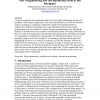Free Online Productivity Tools
i2Speak
i2Symbol
i2OCR
iTex2Img
iWeb2Print
iWeb2Shot
i2Type
iPdf2Split
iPdf2Merge
i2Bopomofo
i2Arabic
i2Style
i2Image
i2PDF
iLatex2Rtf
Sci2ools
120
click to vote
IJMMS
2008
2008
Pair programming and the mysterious role of the navigator
Computer programming is generally understood to be highly challenging and since its inception a wide range of approaches, tools and methodologies have been developed to assist in managing its complexity. Relatively recently the potential benefits of collaborative software development have been formalised in the practice of pair programming. Here we attempt to `unpick' the pair programming process through the analysis of verbalisations from a number of commercial studies. We focus particularly on the roles of the two programmers and what their key characteristics and behaviours might be. In particular, we dispute two existing claims: (i) That the programmer who is not currently typing in code ("the navigator") is constantly reviewing what is typed and highlighting any errors (i.e. acting as a reviewer); (ii) That the navigator focuses on a t level of abstraction as a way of ensuring coverage at all necessary levels (i.e. acting as a foreman). We provide an alternative mo...
| Added | 12 Dec 2010 |
| Updated | 12 Dec 2010 |
| Type | Journal |
| Year | 2008 |
| Where | IJMMS |
| Authors | Sallyann Bryant, Pablo Romero, Benedict du Boulay |
Comments (0)

